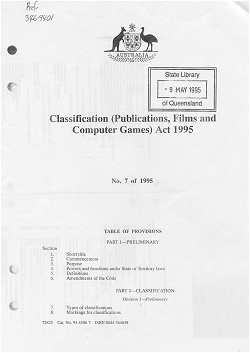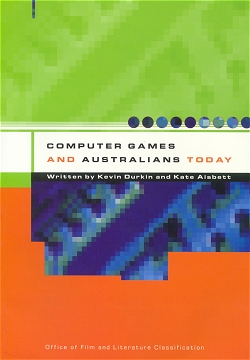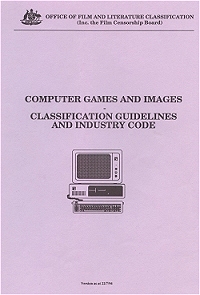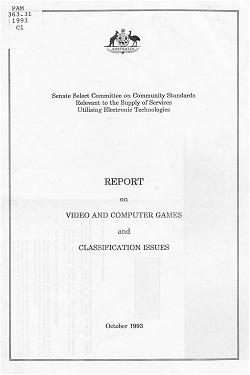
Resources
Computer
Games - Government Publications - Monographs
-
Journal
Articles - Magazine Articles - Newspaper
Articles -
World
Wide Web - Unpublished

 Government Publications
Government Publications
The most influential literature
that is relevant to the Australian computer games censorship issues topic
has been created by the various Governments of this country and their agencies.
Most of this literature can readily be described as pro-censorship, although
much of what has been written by the OFLC often takes a less censorious
view. EBrief topics of most relevance here are how
and why computer games have been censored in this country, the stakeholders
in the debate, and whether these products do indeed encourage any form
of
real-world violence and/or degradation.

- Hansard
-
Hansard presents verbatim
records of the debates held in the Federal and State (e.g. Queensland)
Parliaments. The Hansard excerpts presented here concern legislation
that would censor computer games in various ways within their jurisdictions.
They are an excellent means to discover the concerns politicians had over
the alleged content of these entertainment products and who they perceived
to be the main or exclusive players (i.e.
children).
Commonwealth
of Australia [Commonwealth]. (1994) Parliamentary debates (Hansard).
1994. House of Representatives. First session of the thirty-seventh
parliament (fifth period). 23 August to 8 December 1994. Canberra:
Commonwealth of Australia.
The Classification Bill that
was to result in massive changes to Australia's overall censorship system,
including the institution of censorship for computer games, received bipartisan
support during debates in the House of Representatives. Politicians
were particularly pleased to finally be doing something about what they
perceived to be the rapidly increasing threat posed by computer games to
the moral fabric of society, particularly among the young.
Legislative
Assembly Queensland [LAQ]. (1995a) Weekly Hansard. First session of
the forty-seventh parliament. No. 35. Brisbane: Legislative Assembly
Queensland.
Deputy Premier Tom Burns
presented the Classification of Computer Games and Images Bill to the Queensland
Legislative Assembly to enforce the new Federal Classification Act at the
State level. In his formal introduction to its Second Reading, he
stressed that the protection of children and the strengthening of family
life from the threat posed by computer games was his foremost concern.
Such a concern, he remarked, overrode other concerns of civil liberties
and the need to base legislative decisions on cold, hard evidence.
Legislative Assembly
Queensland [LAQ]. (1995b) Weekly Hansard. First session of the forty-seventh
parliament. No. 36. Brisbane: Legislative Assembly Queensland.
Matters raised in the general
debate on the Queensland games censorship legislation mirrored the bipartisan
support of the original Federal legislation. Computer games were
discussed in far more detail than in the comparable House of Representatives
Hansard because the Queensland Classification of Computer Games and Images
Bill covered only computer games. Once again, protection of children
from a perceived threat was the main goal of the politicians.
- Legislation
-
Computer games are censored
in Australia in accordance with the legislation outlined below. Similar
legislation to that in Queensland has been passed in the other States and
Territories.
Commonwealth
of Australia [Commonwealth]. (1995). Classification (Publications, Films
and Computer Games) Act 1995. Canberra: Commonwealth of Australia.
This Act created a uniform
system of film, literature, and computer games censorship in Australia
to be administered by the Federal Office of Film and Literature Classification.
Most importantly for the computer games censorship topic, the Act formally
instituted a code for computer games classification that did not include
an R rating and caused games to be banned to everyone if they were unsuitable
for a minor to see or play.

Front page of the Commonwealth Classification Act 1995.

Legislative
Assembly of Queensland [LAQ]. (1995c) Classification of Computer Games
and Images (Interim) Act 1995. Brisbane: Legislative Assembly of Queensland.
Complementary Queensland
legislation backed up the new Federal classification system with a list
of penalties that heavily fined any retailer in breach of the new national
censorship system. Curiously, no penalty was to befall anyone who
actually possessed a banned computer game, providing that it did not include
child pornography. Many provisions of the Act specifically target
the makers and possessors of child pornography, especially computer based
images of such acts.
- Office
of Film and Literature Classification -
Analysed below is a representative
cross-section of the copious literature produced by the Australian Government's
censorship body, the OFLC, on the computer games censorship issue.
Through this incredible variety of research into computer games, guidelines
used to rate computer games, and summaries produced when actual games were
rated, most, if not all, eBrief questions can be addressed. Very
little of this information is available online at the OFLC Web site (http://www.oflc.gov.au/),
so this collection concentrates upon offline material. See also Local
Censorship.
Cupitt,
M., & Stockbridge, S. (1996). Families and electronic entertainment.
Sydney: Australian Broadcasting Authority / Office of Film and Literature
Classification.
One of the first Australian
Federal Government sponsored scientific studies into attitudes concerning
computer games within the Australian community, this work shows that many
of the concerns held by politicians when legislating to censor these games
are largely unfounded. In particular, it concludes that parental
concerns over computer games content are considerably outweighed by other
concerns, that parents are able to adequately supervise their children's
use of such games, and most games do not contain any controversial content.
Durkin,
K. (1995). Computer games: their effects on young people - a review.
Sydney: Office of Film and Literature Classification.
The first Australian Government
commissioned study into the effects of computer games on young people involved
extensive research conducted by a university psychologist. He found
that existing overseas research does not prove conclusively that children
are negatively affected by computer games and that Australian research
into this matter was required. This latter recommendation was thoroughly
followed up in future OFLC publications.
Durkin,
K., & Aisbett, K. (1999). Computer games and Australians today.
Sydney: Office of Film and Literature Classification.
At the conclusion of a series
of research projects into computer games and their social implications
that lasted several years, the OFLC produced this work that supported its
earlier publications on similar topics and made some revolutionary recommendations.
In particular, it formally acknowledged for the first time in Australian
Government computer games literature that adults play computer games and,
as such, deserve to have an R rating for games specifically designed for
them. A very brief and loosely annotated bibliography on some related
resources is included.

Font cover of the final report in the OFLC's Computer games
and Australians today study.

Office
of Film and Literature Classification [OFLC]. (1994). Computer games
and images - classification guidelines and industry code. Sydney: Office
of Film and Literature Classification.
The OFLC assesses computer
games by these guidelines that are in full accordance with the Federal
Classification Act of 1995. Allowable classification ratings are:
G, G 8+, M 15+, and MA 15+. Any game containing content above the
MA 15+ level for games is banned to everyone. Material that can ban
a game includes: sexually explicit language, non-educational nudity, simulated
sexual activity, and any depiction of sexual violence. Much of this
banned material can be seen by anyone in films rated as low as PG or M.
Games are deliberately rated more strictly than other visual media owing
to their greater impact because of their interactivity and because children
are perceived as their main players and cannot be adequately supervised
by their largely technologically illiterate parents. The Guidelines
reflect the concerns of politicians upon passing games censorship legislation
- concerns of which have been refuted by more recent research into this
issue.

Front cover of a detailed booklet published by the OFLC concerning
its computer games ratings guidelines.

Office
of Film and Literature Classification [OFLC]. (1995). Phantasmagoria.
Sydney: Office of Film and Literature Classification. [classification
decision summary sheet]
This document outlines the
OFLC's reasons for banning the cd-rom based interactive movie Phantasmagoria.
Two non-interactive scenes were singled out. The most important was
the aforementioned rape scene, but also an earlier consensual scene of
simulated sexual activity that involved some brief, discreet nudity.
Although the document states clearly that the OFLC believed both scenes
to be contextually justified, the ban was made in full accordance with
the computer games censorship guidelines that do not allow contextual considerations
to be taken into account in their blanket ban on depicting all forms of
non-educational simulated sexual activity.
Office
of Film and Literature Classification [OFLC]. (2001a). A review of the
classification guidelines for films and computer games: discussion paper.
Sydney: Office of Film and Literature Classification.
After at least six years
of research into computer games, the OFLC released a public discussion
paper on proposed changes to the games ratings guidelines. Such suggested
modifications include the partial merger of the film and games ratings
guidelines and an R rating for computer games aimed at adults. This
work outlines arguments both for and against the proposed changes and presents
a history and summary of film and games censorship regulation in Australia.
- Senate
Committee -
Various relevant publications
were produced by the pro-censorship Senate Committee that was responsible
for the institution of Australia's current computer games censorship system.
Issues of violence and degradation to women and children are prominently
raised here, as are further examples of the opinions of the pro-censorship
stakeholders in the games censorship debate in this country.
Senate
Select Committee on Community Standards Relevant to the Supply of Services
Utilising Electronic Technologies [Senate Committee]. (1993).
Report
on video and computer games and classification issues. Canberra: Senate
Committee.
All computer games censorship
legislation passed in Australia during the 1990s ultimately owes its existence
to this Senate Report. Headed by Labor
Senator Margaret Reynolds who turned her personal crusade of protecting
children from computer games into official Government policy, it was the
first Government document that recommended games be censored and that they
be regulated more harshly than film (such as with the omission of an R
category). The Committee's conclusions were mostly based on anecdotal
evidence from a few interested conservative members of the public who were
sympathetic to the politicians' concerns.

Front cover of the Senate report that led to computer games censorship
in Australia.

Senate
Select Committee on Community Standards Relevant to the Supply of Services
Utilising Electronic Technologies [Senate Committee]. (1994).
Report
on overseas sourced audiotex services, video and computer games, r-rated
material on pay tv. Canberra: Senate Committee.
Although the Senate Committee's
earlier Report mentioned computer games in far greater detail, this 1994
publication is important owing to its references to the fact that the Senators,
particularly John Tierney (Liberal), were growing impatient that
their recommendations were not being implemented as rapidly as they would
have liked them to be. They restate their earlier concerns about
computer games and mention that actions were already being taken against
these games overseas and that Australia should do the same.
Senate
Select Committee on Community Standards Relevant to the Supply of Services
Utilising Electronic Technologies [Senate Committee] (1996a). Ministerial
committee inquiry into the portrayal of violence in the electronic media
- summary of submissions. Canberra: Senate Committee.
In the wake of the 1996 Port
Arthur Massacre and the subsequent speculation that the perpetrator may
have been negatively influenced by his video collection, public outcry
against violence in the media was quite vocal and caused the newly elected
Coalition Federal Government to launch a Ministerial inquiry into this
matter. Hundreds of submissions were received, all but one percent
calling for a crackdown on this violence. These matters were later
referred to the Senate Committee that usually handles such issues.
The summary makes special mention of the fact that there was very little
evidence of detailed knowledge of computer games among the submissions,
even among those which mentioned them alongside film and video as being
in need of a Government crackdown.
Senate
Select Committee on Community Standards Relevant to the Supply of Services
Utilising Electronic Technologies [Senate Committee] (1996b). The portrayal
of violence in the electronic media - seminar program. Canberra:
Senate Committee.
The Senate Committee's 1996
inquiry into violence in the media included a seminar held at Parliament
House, Canberra on 29 November, 1996 to which relevant community and Government
representatives were invited, particularly those whose submissions to the
earlier Ministerial inquiry had made a significant impression on the Senators.
This seminar had an agenda that included opportunities to discuss computer
games censorship issues, but this chance was passed up by all but a couple
of the dozens of participants. The comments that were raised about
computer games, however, were strongly held by members of both sides of
the censorship debate surrounding them. Overall, the agenda was heavily
weighted towards supporting the increased censorship position.
Senate
Select Committee on Community Standards Relevant to the Supply of Services
Utilising Electronic Technologies [Senate Committee]. (1997).
Report
on the portrayal of violence in the electronic media. Canberra: Senate
Committee.
As the climax of almost a
year of Federal Government investigation into ways in which to crackdown
on violence in the electronic media, this Senate Report makes some powerful
and revolutionary recommendations that reflect the strongly pro-censorship
position held by almost all politicians and others involved in the inquiry
process. Recommendations against computer games include that it be
made illegal to possess any such game banned due to violence. Strangely,
there is no evidence that any of their recommendations were ever put into
place, quite unlike the situation with the Senate Committee's earlier Reports.